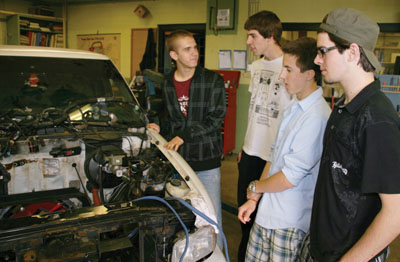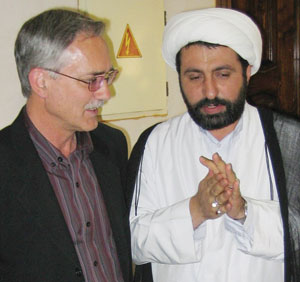Canadian Mennonite
Volume 13, No. 15
Jul. 27, 2009
The wheels are turning
Rockway Mennonite Collegiate auto shop converts truck to electric
Kitchener, Ont.
 |
Removing an engine and exhaust system, installing a new battery-powered electric motor, and researching motors, batteries and the ecological impact of gas versus electric: These are all components of a Grade 12 auto shop elective created by Don Dyck Steinmann, technology teacher at Rockway Mennonite Collegiate in Kitchener.
The four students taking the course are overseen by Ted Wiebe, a retired technology teacher at Rockway. The course involves converting a 1997 GMC Sonoma S-10 pick-up from gas to electric. When completed, the truck will have no direct emissions and, with options to buy “green” electricity in Ontario, could end up being emission-free.
The students see this having a real impact on pollution, rather than just being a research project. Adam Bromley says that his generation is “paying for our parents’ mistakes” in regard to pollution.
Although the truck uses batteries, they are 98 percent recyclable through existing programs, resulting in little waste down the road when the truck’s lifespan comes to an end. With the average person driving 40 kilometres per day, the truck’s 70-kilometre range on a full charge will make it suitable for most people’s driving habits.
Next semester, a new class will complete the project by installing 18 batteries under the bed of the truck and six more in the space left by the gas motor. The project, spread over two semesters, will cost $20,000, half of which was raised by Rockway students through their envirothon/servathon fundraising event. Other support has come from gifts in kind from the automobile industry.
When completed, the truck will be sold, with the proceeds being ploughed back into future environmental projects at the school.
Justice at the expense of peace? Peace at the expense of justice?
Fourth Mennonite/Muslim dialogue engenders mutual understanding, friendships
Qom, Iran
 |
The relationship between justice and peace emerged as a key theme of a conference involving 17 Mennonite-Christian and Shiite-Muslim scholars of religion who met together for four days in May.
In his opening lecture, Ayatollah Rajabi explained that, in Islam, justice is an absolute requirement, while peace is conditional upon justice. While peaceful means are ideal, violence may be required when justice is violated, the innocent are attacked, or people are prevented from worshipping God.
From the Mennonite perspective, such a framework appears to move too quickly to war. How does one know that all peaceful means have been exhausted? Yet, to the Shiite members of the dialogue, which was planned and hosted by the Imam Khomeini Education and Research Institute, the Mennonite commitments to pacifism and forgiveness appear to be at the expense of justice. While Mennonites may be interested in developing yet one more practice of nonviolence, is it morally justifiable to do so while innocent people are being killed?
“It seemed we were trying to ask them if there were moments in the Qur’an or Islam that could resource faithful, yet nonviolent, responses to injustice, while they were demanding us to be more realistic about all the ways they saw war or self-defence justified within our own texts,” said Mennonite participant Susan Kennel Harrison.
Both sides agreed that the human pursuit of justice and peace ought to be rooted in God’s justice and God’s peace. Both have a future-oriented hope for justice to be fully realized upon the return of Jesus (Mennonites) or the 12th Imam (Shiites). Both Mennonites and Shiites are minority groups within their respective religions, and have experienced persecution that shapes their perceptions of the world.
Gordon Zerbe, a first-time participant, noted how the Shiites have a religious imperative to dialogue because of what Islam holds in common with Christianity. At times, there was a remarkable similarity in theological language and concerns. Yet some conversations made evident the significant differences in culture, context and patterns of thinking. “This dialogue required me to contemplate some foundational assumptions of my own faith,” he said. “We often take the logic of our own convictions for granted until we explain it to someone who has a very different frame of reference.”
A difference emerged in the discussion of how to move from sacred text to contemporary context. One Mennonite scholar argued that the social location of the interpreter or the community of interpretation will partly shape what peace or justice looks like in practise. A Shiite scholar countered that the meaning of the Qur’an is always clear; perspective should not affect its meaning.
A related point of divergence was the Shiite conviction that revelation and reason, including the laws of cause and effect, are always consistent. By contrast, Mennonites have often emphasized the “foolishness of the cross.” An institution such as the state may be necessary in a fallen world, but is “outside the perfection of Christ.”
For the Shiites, though, if absolute pacifism is commanded by God, it must therefore be realistic and effective. Yet it appears to be neither. While Mennonites have preferred to speak about the church, rather than the state, as the community of peace and justice, Shiite dialogue partners asked whether this is a consistent position for assimilated U.S. and Canadian Mennonites, who benefit from the prestige and power of their states whether they like it or not.
The Mennonites presented papers on biblical perspectives, the centrality of Jesus for peace and justice, pacifism, church, martyrdom, advocacy, and the history of Mennonite practices of peace and justice. Shiite presentations examined the relationship between justice and peace in the Qur’an, war and jihad, eschatology, divine mercy, and the nature of the international political order.
This conference, the fourth in a series that began in 2002, grew out of an exchange program between Mennonite Central Committee (MCC) and Islamic research institute, in which Iranian doctoral students study at the Toronto School of Theology, and Mennonite couples from North America live and study in Qom. The Mennonite delegation extended an invitation to a fifth dialogue, to be held somewhere in North America in 2011.